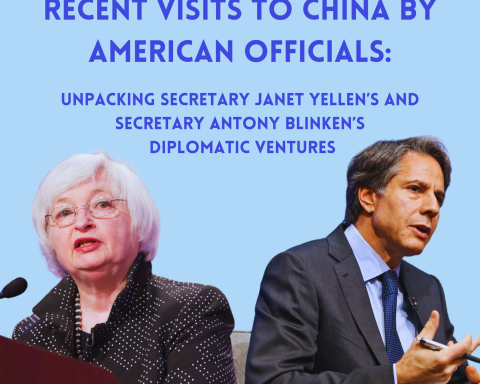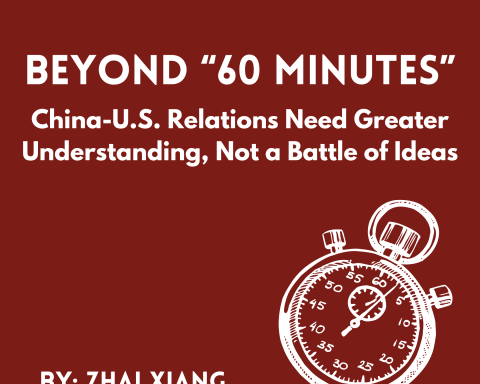The following piece was written by China Focus intern, Bikai Chen. Bikai is a recent graduate of the School of Advanced International Studies (SAIS) at Johns Hopkins University, where he majored in international relations.
In June, Liu Weidong, a researcher at the Institute of American Studies of the Chinese Academy of Social Sciences, one of the most important official think tanks in China, and executive editor of the Contemporary American Review, spoke at an online forum hosted by the National Academy of Development and Strategic of Renmin University of China about the need for China to re-examine its relationship with Russia. He argued that the relationship between China and Russia is complex and that an alliance between the two would bring more problems than cooperation. Liu’s comments echoed a sentiment that other intellectuals in China have expressed both publicly and behind closed doors.
He also noted that the U.S. often accuses Russia of having China’s support behind its actions, that is, deliberately binding China and Russia together with the aim of forcing, or inducing, China and Russia to establish an alliance that would lead to mutual exhaustion between the two countries. While China has always sought win-win cooperation, Liu does not believe that Russia can be a win-win ally with China. Instead, he explained that Russia is leverage China’s support, and has skillfully prevented China from using itself. Before continuing to develop relations with Russia, Liu stressed the need to think carefully about some strategic questions, like “What does Russia think about China? What exactly does Russia hope to gain through cooperation with China?” Liu Weidong, while not suggesting that China stand against Russia, still has reservations about further developing China-Russia relations. Long before Liu, other Chinese scholars were rethinking and reassessing China-Russia relations.
Tang Shiping, a professor at Fudan University’s School of International Relations and Public Affairs, is one of the more moderate of these scholars. He believes that “maintaining good China-Russia relations is still necessary for China, but such relations must have a bottom line.” He writes that China must resolutely avoid strategic overdrafts; in the face of great uncertainty, China must maintain its strategic stamina, avoid getting involved in unnecessary strife, and even engage in appropriate strategic contraction. He also stresses that China must avoid excessive involvement in regional and national affairs where the outlook is very uncertain or even very dangerous. Although Tang uses Afghanistan as an example in his article, current Ukraine also meets his criterion of a “very uncertain or even very dangerous outlook.” It can be assumed that Tang, while still seeing Russia as an important partner for China, is opposed to China giving Russia substantial support in the Russia-Ukraine war.
President of the Shanghai Public Policy Research Association Hu Wei, on the other hand, has a very strong and vocal stance against China-Russia relations. If Liu Weidong’s and Tang Shiping’s propositions do not deviate from Beijing’s existing policies, Hu’s proposals could be seen as radically changing the status quo in China-Russia relations, and thus have sparked a great deal of controversy in China. Based on his predictions about the direction of the Russia-Ukraine war and its impact on the future international landscape, he suggested that the Chinese leadership abandon its neutral stance between Russia and Ukraine, side with the majority of the world’s countries and cut ties with Putin as soon as possible to avoid being dragged into his troubles. On the first anniversary of the war, Hu again published an article arguing that China’s position paper on the settlement of the Ukrainian crisis, which does not propose a specific solution to the conflict, “will not have a substantial impact on the resolution of the war but will have important consequences for how China itself will be positioned in the international community in the future.”
Su Xiaoling, a contributing researcher to the Beijing Society of Reform and Development, also takes a very strong stance on China-Russia relations. Unlike the above three scholars who discuss China-Russia relations from the perspective of China’s national interests, Su points out that Russia’s actions are a wanton violation of national sovereignty, as well as a threat to and destruction of freedom and peace from a purely moral and emotional perspective. He believes that China should play a more active role in ending the Russia-Ukraine war. He has argued that China must condemn Russia based on right and wrong and moral responsibility, otherwise, it will be difficult for China to play a fair role and offer a just solution to the underlying problem.
Besides Su Xiaoling, the other three scholars, although they have different attitudes toward China-Russia relations, all invariably link such relations to China-U.S. competition and see China-Russia relations as a tool that can be used to serve China-U.S. competition. Tang Shiping argues that “the United States is the only beneficiary of the current Russia-Ukraine war, and China needs to work with other countries to restrain the U.S. war machine.” “Restraining the U.S. war machine” is an area where he feels China-Russia cooperation can still be useful, which is consistent with his judgment that maintaining good China-Russia relations is still necessary for China. Liu Weidong, on the other hand, argues from the U.S. perspective that the push for excessive closeness and even alliance between China and Russia is a means used by the U.S. to deplete China. In contrast to Tang and Liu’s negative attitude toward the United States, Hu Wei advocates that China should establish a good image in the Western world by completely abandoning Russia and using this as an opportunity to try to ease relations with the United States and the West. He hopes that this will change the U.S.’s hostile attitude toward China and help China escape its isolation. It is thus clear that the current course of China-Russia relations is deeply influenced by the competition between China and the United States. As the China-U.S. rivalry becomes more and more intense, China-Russia relations will also play an increasingly important role in the future international situation.
The current direction of China-Russia relations is heavily influenced by the Russia-Ukraine war, the China-U.S. rivalry, the direction of Russia’s internal affairs, and China’s economic development. As these factors change, some of the changes are even unexpected. It is believed that China’s leaders will be far-sighted enough to keep pace with the times, in order to lay a solid foundation for the defense of China’s national interests and to ensure that the Chinese people can live and work in peace and contentment.




